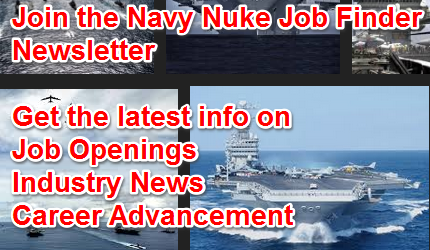This is a living document developed to assist in finding operator jobs in the commercial nuclear industry. It’s not designed to talk you into or out of working in the commercial nuclear industry, just to help in answering the basic questions about what the jobs are and how to apply.
Guest Contribution by James Proctor, Nuke ELT, Bio below.
Contents
3 Operator Levels
First, there are 3 operator levels, and the job titles are different among the different companies who own the reactors. We’ll cover those titles later.
Step 1: What do you want to do?
NLO (Non-licensed operator):
Attends training with the end goal of qualifying to operate plant equipment in the field.
This includes starting/stopping equipment, opening/shutting/racking out breakers, operator rounds (log taking), tagging activities, performing maintenance/surveillance testing, communicating abnormal conditions to the control room, and taking corrective action.
Sometimes will be a represented position (i.e., IBEW union). Some companies require that these operators attend license training to become a licensed RO/SRO after some amount of time.
(At Exelon, I have seen NLOs with as little as ~12 months of shift experience attend license class voluntarily. Also, there is a 12 month (Exelon) probationary period of being at an “Associate” level before the promotion/raise to full NLO).
RO (Reactor Operator):
Has attended license class and is qualified to operate the Main Control Room (MCR) controls (reactivity manipulations). Can also perform most if not all NLO tasks in the field. While it is possible to be hired directly to RO, not many companies seem to do it. The typical job path is through NLO. Will sometimes be a represented/union position.
SRO (Senior Reactor Operator):
Has attended license class and is qualified to direct licensed activities of licensed operators (similar to PPWO/EOOW).
Also licensed to manipulate the MCR controls but it’s not common that they do. This is a non-union management position. Supervises/directs in-field activities.
There are several different paths to SRO, and any path that skips RO is considered “Direct” or “Instant” SRO. NLO->SRO, RO->SRO, Navy->SRO, degreed personnel->SRO (the degreed personnel one is the common path for Engineers, Maintenance supervisors, etc). Each company may have its own way of determining eligibility, but those policies are based off of the same regulatory and industry guidance.
All 3 training programs include training on fundamentals (heat transfer, reactor physics, etc), systems (condensate, feed, RPS, station electrical, etc), and on-the-job training. Candidates for RO/SRO licenses will have a lengthy stint of training in the simulator (which is the best part, in my opinion).
There are many opinions on what route you should go. You may be drooling over the SRO’s salary and bonus structure, but you should know that NLOs make great money. NLOs who attend license class for RO/SRO have a higher success rate due to the familiarity with the plant. Instant SRO is far from easy, but it is manageable if you have the right attitude.
Step 2: Where do you want to live?
Below, we have embedded a webpage from the USNRC. The graphic shows the general location of all the operating plants. But before you get too excited:
- Research the current news for the station, some may have announced a closure in the coming years.
- Look up the current operating license, as it may expire in the near future
These shouldn’t be showstoppers, as some plants often use plant closure as posturing for more favorable energy legislation (personal experience). The NRC also grants license extensions. Good questions to ask during your interview to gain insight.
Here’s a more detailed list that also shows who the owner/operator is. You can also click on each unit to see when the license expires:
https://www.nrc.gov/reactors/operating/list-power-reactor-units.html
Unfortunately, companies aren’t always hiring operators because they’re either at staffing or outside of a class/hiring cycle. Figure out what company operates the plant and reach out via NNJF or HR to gain some idea of when they might be hiring.
Step 3: Are they hiring?
Now that you know what company operates the plant, do an internet search for “(Company name) careers”.
Job titles vary between companies. If able, narrow the search results to “Operations”, “Nuclear”, or something to that effect, along with your desired location. The results should be easier to navigate now.
Typical SRO Titles in Job Postings
- ILT Trainee
- Initial License (SRO) Trainee
- Unit Supervisor
- Control Room Supervisor
- Field Supervisor
- Nuclear Unit Supervisor
Typical RO Titles in Job Postings
- Reactor Operator
- Nuclear Control Operator
- Control Room Operator
- Control Board Operator
- Plant Control Operator (In Training – PCOIT)
(Any others? Drop in the comment section. Not too many direct RO jobs out there)
Typical NLO Titles in Job Postings
- Non-licensed operator (I think the industry is phasing this term out)
- (Associate) Equipment Operator
- (Associate) Aux/Auxiliary Operator
- Plant Control Operator (In Training – PCOIT)
- (Associate) Plant Operator
COMMENTS CAN BE ADDED IN THE COMMENTS SECTION OF THE FACEBOOK POST.
About the Author: James Proctor is a 10 year ELT/Supervisor on Subs, NPTU Staff, current Operations Instructor at a Commercial Nuke Plant.
EDITOR’S NOTE: The author, James Proctor invites you to add/clarify the information presented (in the comments section of the Navy Nuke Job Finder Facebook Group). James’ perspective is from the company he works for and certain other information he has researched. James does not claim to be an expert on the above subject matter.

